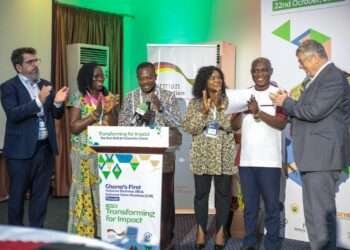Stephen Asamoah Boateng, the Director-General of the State Interests and Governance Authority (SIGA), has stated he would terminate the Teshie Desalination Project contract if he had his way.
The SIGA boss was stunned by the fact that with the replete source of fresh water bodies in the country, some entities deem it necessary to desalinate sea water for utility.
Speaking on the state broadcaster (GTV) platform on the topic, “Making State Enterprises Profitable and Resilient”, Mr. Asamoah Boateng revealed that had the situation been the reverse without being tied down by the contractual obligations, he would have opted out having his own way.
“Why would you want to desalinate sea water when you have clean water bodies like the Volta that has been dammed at Akosombo, and you can even supply to Togo if you are serious. It is terrible, if I had my way, I’ll cancel it”.
In furtherance, Mr. Asamoah Boateng backtracked to similar deals which were carried out by the previous government, which on his take, should equally be terminated.
According to him, such deals bestow state entities with legacy debts as the government did not consult the managers of the institutions before they secured funds to undertake those projects.
“Why would you for instance, contract a loan of $275 million to develop Terminal 3 when it could have even built a brand new airport? So you go and contract and commit the state entity without talking to them; and then you give them legacy debt, then you tell them to turn things around. The policy direction must be correct and this why President Akufo-Addo has said you cannot go and do anything without talking to the central body that oversees the institution’s activities.”
That notwithstanding, he commended some Chief Executive Officers of the various state owned businesses for how they have handled state institutions during the COVID-19 pandemic.
“I want to commend the CEOs because they have realized especially in the Covid era that you have to cut down on the wastage to prune down your expenditure.”
“The deal was set up in a way to milk the system. Why would you want to change sea water and it’s not like we are on a desert. I can understand Libya or Israel will go in for such a deal, but we have a lot of water bodies in Ghana so you cannot develop that?”
The plant, which was shut down for about a year over some technical and operational challenges, resumed operation on March 18, this year.





















